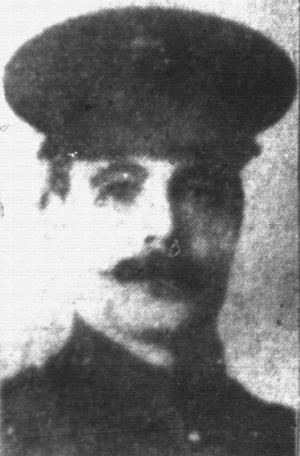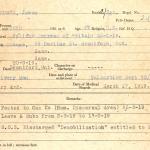BX October 25, 1914
The Life of a Young Lad Snuffed Out – Fatal Accident at the McHutchion Stables Yesterday – Leslie Mounce – Unfortunate Lad, Buried in Pile of Oats, Was Suffocated
A sad accident occurred at 4.20 yesterday afternoon when through the failing of the wall of the McHutchion stable on Colborne Street, Leslie Mounce was suffocated to death. The case is particularly sad, as the young lad’s father is at the present time with the Canadian contingent at Salisbury Plain camp, England, on his way to the front, he County Constable James Mounce, having gone with the Twenty-Fifth Brant Dragoons from this city.
Mounce who was but 16 years of age, was engaged with Walter and Harry Carpenter in unloading oats into the oat bin at the southeast end of the brick stable on the north side of Colborne Street. The load of bagged oats had been taken off the wagon and the men were in the bin emptying the oats out of the bags. Suddenly the wall parted with a grinding crash, and before the men could get out of the bin the oats started to flow out. Mounce was nearest where the wall had been and was carried down by the flood of oats. Some had preceded him, and when he struck the mixed pile of bricks and oats he was unable to get free, and the continued flow buried him three feet deep.
Rescuers Worked Hard
Immediate steps were taken to dig him out by those men who had not been carried down, assisted by others attracted to the scene by the crash. They dug away, but the oats continued for some time to come, down from the bin, so that though they worked desperately in the narrow space, it was at least eight minutes before they could get at the body. A call was put in for the lung-motor, which was taken down by the fire department, but Dr. Phillips found that life was extinct, and there was absolutely no use in attempting to revive the spark of life, heart action having stopped.
The body was not marked, showing that the lad was not struck by the bricks of the falling wall, but that he had been suffocated. That he had endeavored to put up a fight against being smothered was shown by the fact that the mouth was covered with froth, brought up from the bronchial tubes and lungs in the fight for life.
Inquest opened
Coroner Fissette was called and decided to hold an inquest. A jury was empanelled last evening, and after viewing the body the inquest was adjourned until Tuesday evening at the police station, at 8 o’clock when a thorough investigation will be conducted into the cause of death.
The Wall Buckled
The wall, as it appeared after the accident was built of double brick, without any inward supports, and when the pressure of oats became great it buckled. It is said by employees who last year put oats into the same bin, that there was not half as much in it when the accident occurred as had been stored in previous years.
The barn was owned and used by the McHutchion bakery.
Why the Fire Alarm?
One question being asked as a result of the accident is regarding the identity and purpose of the person who rang in the fire station. The first ladies were called by the police to bring the lung-motor. After that some person put in a telephone alarm for the fire department, and both the central and east war companies answered, making the excitement all the greater.
Arrangements for the funeral were completed this morning. The private service at the house will be held at3:30 on Sunday afternoon, and the service at Grace Church at 4 o’clock punctually. Very Rev. Dan Mackenzie will officiate.
The late Leslie Mounce was a member of the Grace church choir for some years, until his boy soprano voice failed. He was the secretary of the Fred Myring Bible class of that church, and in many ways was an efficient church worker.
He leaves to mourn the loss his father, James Mounce, now with the first Canadian continent, his mother who first learned of the accident when she was hurrying home to get the young lad’s supper yesterday afternoon, and two sisters, Gladys and little Dorothy. He had tried to join the first contingent with his father, saying “I can only die once and I might as well die as a hero in defence of my country,” but his mother pleaded with him to stay as his father was going away. The accident, is therefore particularly sad in its result.
BX May 8, 1916
Transport Work With 4th Batt. – Sergt. James Mounce Returned to City on Furlough
It is worth a man's life to see the sights that are daily enacted on the battlefields of Flanders and Belgium, according to Sergt. James Mounce, former county constable, who arrived home last evening on a short furlough. One sight that would never be forgotten would be the daily air fights in which the aviators fought like mad men. Sergt. Mounce returned with a party of physically unfit men. Two months ago he left the front but much time was lost in Shorncliffe making up the party. He expects to have about ten days in the city before returning.
He arrived from Toronto on the 7.32 train. He was met at the station by representatives of the Soldiers' Aid Commission and dozens of his old friends. A formal reception would have been tendered to him but the Soldiers’ Aid Commission did not learn of his intended arrival till it was too late. After he had been taken to his home he was tendered a welcome at the headquarters of the 215th Battalion where an entertainment was in progress.
Sergt. Mounce left Brantford with the first draft from the 25th Brant Dragoons in August, 1914. They were later attached to the 4th Battalion as a transport column. He was in charge of five transport wagons at the front. All his work was done at night after dark, one wagon being allotted to each company. When interviewed he was very reticent in regard to the happenings at the front but said that if the war were only over he could have told many interesting stories. However, so many untrue stories were told in letters and by returned men that the less said the better, in his opinion. Canadian papers were formerly received by bundles, but now, the only papers received, are those that are mailed direct to the men.
He was high in his praise of the Brantford officers; Brantford bar none, having put out the finest bunch of officers. They have all proved themselves officers on the field of battle. He referred particularly to Lt.-Col. Colquhoun, Major Jones and Capt. Miller. All have been continually in the trenches and were as game as could be. Major Jones had not, he said, missed a day since he went there.
For transport work the 4th Battalion has 79 horses. Exceptionally good luck has been experienced with these horses, hardly any being lost. There had not yet been a casualty amongst the transport men of the battalion, though a number had suffered minor accidents however.
It will be recalled on Sergt. Mounce's return that when he enlisted his son Leslie wanted to go with him. Listening however to his mother's pleas, that she did not want both husband and eldest son to go, he promised to wait a while. Shortly after the departure of his father however, he was suffocated in an avalanche of oats when a wall in John McHutchion's storage warehouse collapsed.
BX May 18, 1916
Furlough Over
Sergeant James Mounce of the transport section of the 4th Battalion, who has been in the city for the past ten days on furlough, leaves tomorrow to return to the trenches. Sergt. Mounce returned with a party of physically unfit men. He left the trenches two months ago, but much time was spent in making up the party at Shorncliffe.
BX January 2, 1929
James Mounce, City Employee, War Veteran, Died Suddenly – Was One of First to Enlist From Brantford, for Overseas – Ten Years as Superintendent of City Garbage Department
James Mounce, one of the best known of the employees of the corporation, and one who had been very active in Brantford military circles for many years, being one of the first to leave for overseas upon the outbreak of the late war, died very suddenly yesterday afternoon following a heart attack.
Mr. Mounce had been about as usual showing no signs of impending illness until his seizer in his home, 187 Dundas Street, about 3 o’clock yesterday afternoon. He was removed to the hospital under the care of Drs. R.L. Hutton, W.L. Hutton and C.C. Alexander, but could not be rallied and passed away about an hour later. Mr. Mounce was in his 60th year.
One of the first to enlist for active service following the outbreak of the World War, Mr. Mounce went overseas with the 4th Battalion and served as transport sergeant with that unit right through to armistice.
He received the appointment as superintendent of the city garbage department upon his return to Brantford after the cessation of hostilities. Continuing his interest in local military activities. Mr. Mounce just recently completed 20 years military service, and at the time of the Armistice Day observances in the city last November was decorated with the Long Service Medal by General E.E. Bell, C.M.G., D.S.O. He had been with the 10th Brant Dragoons since the war, being farrier-sergeant to that unit. He was a member of Brach 90, Canadian Legion, B.E.S.L.
Mr. Mounce was born in Devonshire, England and came to Canada 40 years ago. He served as Brant County constable for a number of years before the war and on March 18, 1919, he accepted the appointment of superintendent of the city garbage department, by which capacity he gave diligent and faithful service. To these duties were added in recent years those of inspector and sanitary inspector.
He is survived by his widow and three daughters, Miss Dorothy Mounce, at home, Mrs. Walter Morris, St. Paul Avenue; and Mrs. J. Milton.
The funeral will be held tomorrow afternoon with full military honors in charge of the 10th Brant Dragoons from Beckett’s undertaking parlors to Mount Hope Cemetery.
BX January 4, 1929
James Mounce
The funeral of James Mounce took place yesterday afternoon, with full military honors, from Beckett’s undertaking parlors, to Mount Hope Cemetery. There was a very large attendance representative of the various military units of the city, Dragoons, Battery, Machine Gun and Dufferin Rifles, and Mr. Mounce’s unit overseas, the 4th Battalion, among the officers present being Col. Malcolm A. Colquhoun, C.M.G., D.S.O., Lieut.-Col. J.M. Ferguson, Col. Ashton B. Cutcliffe, Lieut.-Col. Stanley R. Wallace, Major Sidney Rogers and Major Harry G. Watson. Mayor Beckett and the City Council and the various city departments were also represented. Rev. A. Perry Parks, pastor of St. James’ Anglican Church, officiated at the services and the remains were conveyed on a gun carriage to the cemetery where a firing party from the 10th Brant Dragoons, in charge of S.M.M. Winters was in attendance and the last post was sounded by Trumpeter S.M. George Holmes.
The pallbearers were: Regimental Sergeant Major Arthur K. Roberts, Sergeant Major Stephen Cara, Sergeant Major Horace Ellins and Quartermaster Sergeant William Bell of the 10th Brant Dragoons; Sergeant Major Albert Davis of the Dufferin Rifles and S.M. J. Harmer of the 3rd Company, 3rd C.M.G.C. There were a great many flowers.


